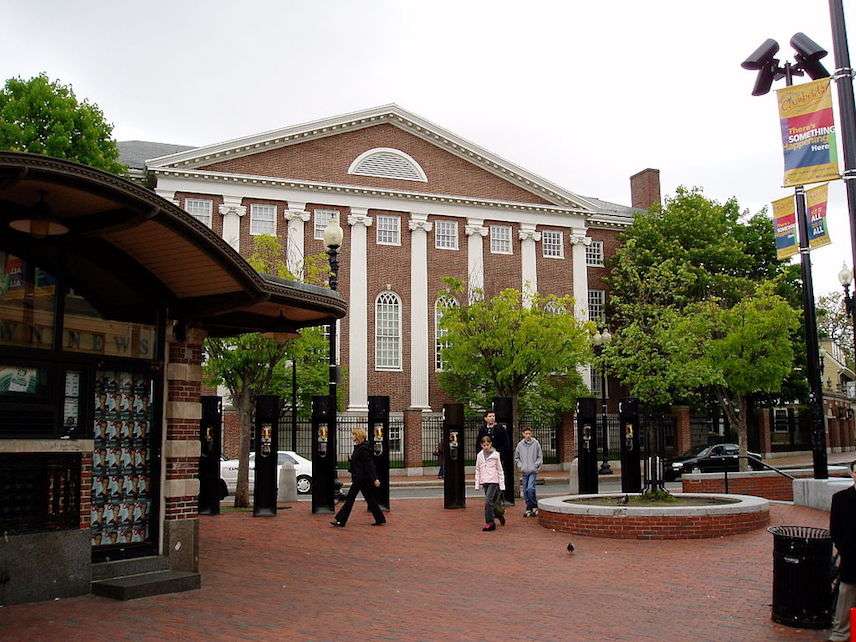Harvard Crimson: University Is Right to Ban Fraternities, Wrong to Ban Sororities
Assault on freedom of association

Harvard University has plans to purge all single-sex social organizations from campus. The editors of the Harvard Crimson are perfectly okay with that—with the exception of sororities.
All-male clubs are bad, all-female clubs are good, runs the simple logic of the student-run newspaper. Which is funny, given that one of the justifications for getting rid of those clubs is that they are discriminatory.
The editorial dropped a few weeks after a committee recommended that Harvard's administration upgrade to a full-on ban its previous policy of imposing sanctions on students who join finals clubs. "The discriminatory practices of these organizations undermine our educational mission and the principles espoused by this Faculty and distance their members from their College experience," wrote the committee.
The Crimson agrees:
We support this recommendation, and we urge University President Drew G. Faust to do so as well. It importantly expands the discourse beyond issues of gender inequality and sexual assault to the role exclusionary social organizations play in perpetuating outdated notions of elitism, classism, and exclusivity on campus. The report rightfully highlights how these organizations impact students' sense of belonging at Harvard, especially those who come from lower socioeconomic backgrounds. Given the serious influence of final clubs on the daily social life of Harvard undergraduates, we see this recommendation as necessary.
But:
Our support does not come without reservations about the process. The composition of the committee is primarily faculty members, and they may not be close enough to student life. Although their input is welcome, the weight of the decision should rest with deans and administrators who are trained to have student social life under their purview. Moreover, as we have opined in the past, we wish it was possible for administrators to better distinguish male final clubs and sororities. If the committee seeks to combat exclusivity and foster belonging, arguably sororities can provide a supportive role by giving women a social space on campus.
The university should combat exclusivity by excluding students who do not identify as female from forming exclusive clubs? At least the more comprehensive ban is even handed.
Harvard is a private institution, so it can implement whatever policy it wants: a ban on only finals clubs and fraternities, a ban on all single-sex groups, whatever. Whether such a course of action is wise is another matter.
The policy appears to punish students for political reasons—a consistent refrain has been that the finals clubs are not "progressive" enough. And since these groups were never officially recognized by Harvard in the first place, it puts the university in the strange position of trying to prevent students from freely associating with each other in an unofficial capacity. Will the administration employ spies to make sure too many students of same sex aren't hanging out together in a club-esque way?
Steven Pinker, a professor of psychology at Harvard, has criticized the university for trying to eliminate single-sex clubs:
A university is an institution with circumscribed responsibilities which engages in a contract with its students. Its main responsibility is to provide them with an education. It is not an arbiter over their lives, 24/7. What they do on their own time is none of the university's business.
One of the essential values in higher education is that people can differ in their values, and that these differences can be constructively discussed. Harvard has a right to value mixed-sex venues everywhere, all the time, with no exceptions. If some of its students find value in private, single-sex associations, some of the time, a university is free to argue against, discourage, or even ridicule those choices. But it is not a part of the mandate of a university to impose these values on its students over their objections.
Universities ought to be places where issues are analyzed, distinctions are made, evidence is evaluated, and policies crafted to attain clearly stated goals. This recommendation is a sledgehammer which doesn't distinguish between single-sex and other private clubs. It doesn't target illegal or objectionable behavior such as drunkenness or public disturbances. Nor by any stretch of the imagination could it be seen as an effective, rationally justified, evidence-based policy tailored to reduce sexual assault.
This illiberal policy can only contribute to the impression in the country at large that elite universities are not dispassionate forums for clarifying values, analyzing problems, and proposing evidence-based solutions, but are institutions determined to impose their ideology and values on a diverse population by brute force.
Pinker is right. Harvard—and The Crimson—deserve all the opprobrium they're likely to receive.


Show Comments (156)